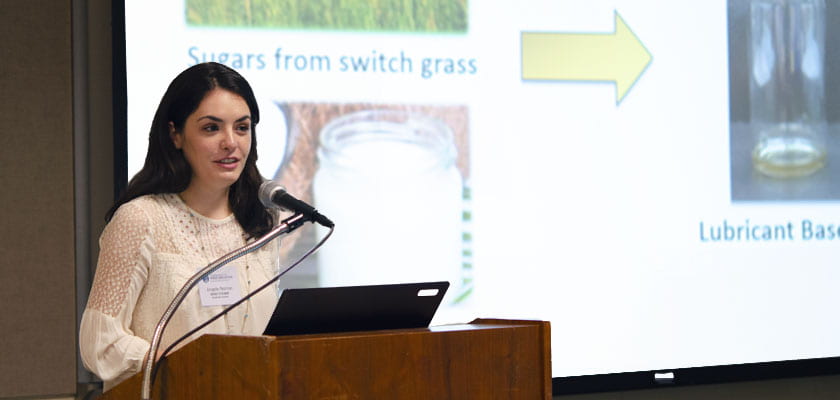UD-led catalysis center hosts 2019 spring symposium
Faculty, postdoctoral researchers, and graduate students representing universities and national laboratories from around the U.S. gathered at the University of Delaware over the weekend for the 2019 Catalysis Center for Energy Innovation (CCEI) Spring Symposium. The annual event serves as a showcase for research focused on developing catalytic technologies — the spurs that move chemical reactions along — for converting biomass, such as trees and grasses, into chemicals and fuels.
Dion Vlachos, CCEI director and the Allan and Myra Ferguson Professor of Chemical and Biomolecular Engineering at UD, hailed the symposium as a vital demonstration of the critical energy, economic and environmental challenges that CCEI’s research addresses.
“This symposium marks the 10th anniversary since the center was founded,” Vlachos said. “The impact of long-term investment from the Department of Energy and the University of Delaware—along with the talent and devotion of our students, postdocs, staff, and faculty—have driven an enormous amount of innovation and fundamental knowledge advancement. The symposium this year was an opportunity to celebrate some of these recent accomplishments and plan the future ahead.”
Since its inception as one of the nation’s Energy Frontier Research Centers in 2009, the UD-led CCEI has set numerous milestones in catalysis research, discovering or greatly advancing processes that can produce soap, jet fuel, adhesives and many other useful products from substances typically regarded as waste.
Attendees at the two-day event were treated to a talk by Dr. David Babson, Ph. D., Program Director at the Department of Energy’s Advanced Research Projects Agency–Energy (ARPA-E). Babson’s remarks focused on CCEI’s vital contributions to carbon efficiency and management, as well as the importance of the circular carbon economy.
“One of the biggest challenges of the new bioeconomy will be storing and managing more carbon than what we emit,” Babson added. “Lots of hard work needs to be done to accomplish that, especially in catalysis, and CCEI is bringing together the right types of expertise to address those challenges.”
The symposium also featured a full schedule of presentations and poster sessions, assembling research from graduate students, postdoctoral researchers, and faculty from across CCEI’s twelve partner institutions.
Angela Norton, a UD graduate student who conducts research for CCEI, lauded the symposium for providing a snapshot of the center’s collaborative inquiry and teamwork.
“For me, the symposium has highlighted how each institution involved in CCEI brings a unique piece to solving one big puzzle,” she said. “Together, we’re all asking the same question: how do we convert renewable materials into fuels and chemicals using catalysts?”
Norton’s poster, titled Branched Lubricant Base Oil Production via Aldol Condensation, focuses on CCEI’s development and testing of lubricant base oils, which have the potential to replace petroleum-derived bases and, in turn, reduce greenhouse gas emissions associated with lubricant production.
Norton expressed gratitude for the symposium shining a spotlight on the important role students can play in advancing research.
“Not only have I increased my knowledge and network,” she adds, “but it’s given me the opportunity to develop as a professional and receive a fresh perspective on my research.”
About CCEI
The Catalysis Center for Energy Innovation is a multi-institutional research center led by University of Delaware and comprised of 10 academic institutions and two national research laboratories. Supported by the U.S. Department of Energy, Office of Basic Energy Sciences, through its Energy Frontier Research Centers (EFRC) program since 2009, CCEI and its researchers have been developing innovative catalytic technologies to efficiently convert biomass, such as trees and grasses, into chemicals and fuels.
For more information on CCEI, visit ccei.udel.edu.
Article by Kevin Liedel

